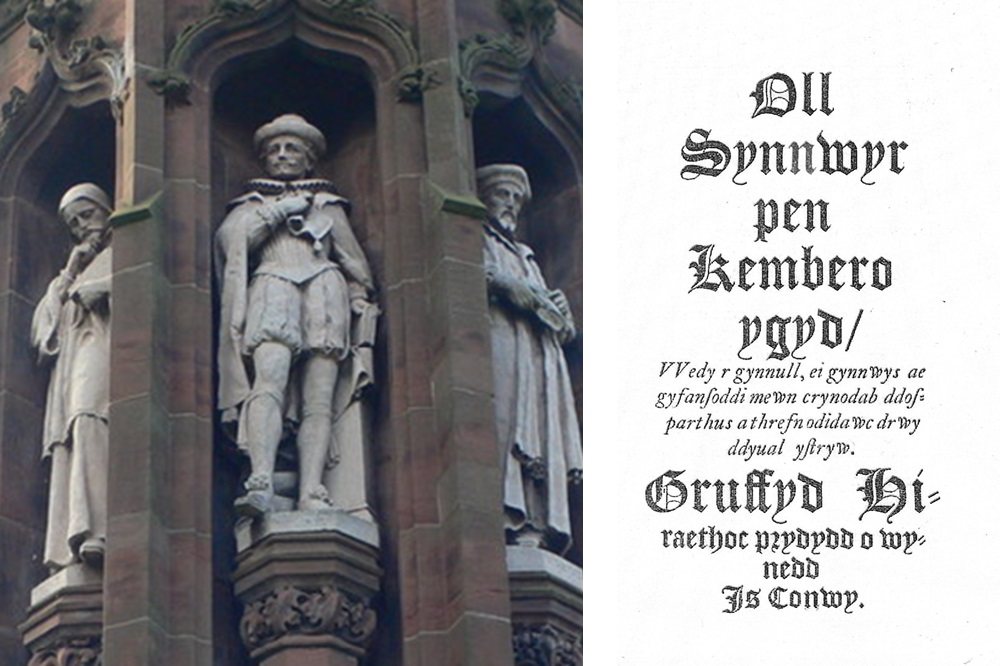Yr Hen Iaith part forty-two: The ‘Bromance’ of William Salesbury and Gruffudd Hiraethog

We continue the history of Welsh literature as Jerry Hunter guides fellow academic Richard Wyn Jones through the centuries in a series of lively podcasts. This article complements episode 42.
As was noted in the last instalment, the humanist William Salesbury praises the bard Gruffudd Hiraethog profusely in his introduction to the 1547 book, Oll Synnwyr Pen Cymro.
Other evidence from the sixteenth century encourages us to see the humanists and the bards as two very different types of literati competing over the future of the language and its literature.
For this reason, it’s worth giving more attention to the relationship between William Salesbury and Gruffudd Hiraethog.
Here we have perhaps the most famous of sixteenth-century Welsh humanists and an industrious bardic teacher who played an important role in the maintenance of that traditional literary culture, and these two men enjoyed a close, productive and friendly relationship.
Having touched upon what Salesbury wrote about the bard, we’ll now look at the other side of the coin and consider a praise poem which Gruffudd Hiraethog composed to the humanist.
In addition to providing a window on the relationship between these two important literary figures, this text is also a great example of the way in which the old and the new are combined in Welsh poetry from the period (see episode 35 in this series, ‘Maintaining Tradition in an Age of Change’).
Praise
This is a traditional praise poem in many ways. It uses the strict cywydd metre, it describes the subject as ‘generous’ (hael), it praises his home and it praises his lineage.
However, William Salesbury’s learning is the attribute which Gruffudd Hiraethog praises in the most detail:
Fo ŵyr dy gorff, wrda, i gyd,
Foddion y saith gelfyddyd;
Ystryw holl soffistri hen
Yw’r dichell o Rydychen.
Rhoi dadl, parod ydwyd,
Ac ar ddysg rhagori’dd wyd.
‘Your entire body, good man, knows
The ways of the seven arts;
The artifice of all old sophistry
Is the cunning of Oxford.
Presenting an argument, you are ready,
And in learning you excel.’
Buzzword
This is a memorable description of the humanist’s Oxford education. And here we find the sixteenth-century Welsh buzzword which suggests the essence of Renaissance humanism: dysg, ‘learning’.
Indeed, in the final line of this poem Grufudd Hiraethog tells William Salesbury that he is Pen dysg a champau yn d’oes, ‘the chief of learning and achievements in your age’.
We remember Salesbury today primarily for his work with language – A dictionary in Englyshe and Welshe, the passionate linguistic manifesto in his introduction to Oll Synnwyr Pen Cymro, and his work translating the New Testament into Welsh from the original Greek.
It is thus wonderful to see that a poem written during his lifetime details this mastery of languages:
O’th enau pumiaith union
A’r un sydd i’r ynys hon:
Brig perffaith Lladiniaith deg,
Brau groyw Ebryw a Gröeg,
(Band hyfedr ben to ifainc?)
Brytaniaith, a phrifiath Ffrainc.
‘From your mouth [come] five precise languages
And the one of this island [English]:
The perfect pinnacle of fair Latin,
Fine pure Hebrew and Greek,
(Is he not the extremely accomplished leader of a young generation?)
Welsh, and the main language of France.’
Aboriginal
The word used for Welsh here, Brytaniaith, might be translated as ‘Brythonic’; it describes the language in a way which stresses its status as the original aboriginal language of the island (perhaps contrasted with English, the official language of the island, noted four lines earlier).
The bard is invoking a constellation of traditions about Yr Hen Frytaniaid, ‘the Ancient Britains’, the heroic ancestors of the Welsh, and he does this while praising Salesbury’s heroic achievement as a linguist.
This theme is also manifest in another of the poem’s lines, Brytwn ddull, Brytanaidd iawn, ‘The way of a Briton, extremely Brythonic’; Gruffudd Hiraethog is not describing his humanist friend as ‘British’ in the sense common in the twenty-first century, but rather as one maintaining the ancient language and culture of the original inhabitants of the island.
We’d expect a traditional praise poem to compare its subject to notable characters from Welsh tradition.
Interestingly, while praising Salesbury’s learning in ways which reflect the new culture of Renaissance humanism, Gruffudd Hiraethog also emphasizes this by reference to an old Welsh literary tradition by saying that he is Wiliam irddoeth fel Merddin, ‘Freshly-wise William, like Myrddin’.
Merlin
Myrddin, of course, is the original Welsh name behind Merlin. The humanist is doeth, ‘wise’, in a way which is ir, ‘fresh’, yet this newness is coupled with a name suggesting centuries of Welsh literary tradition.
As is suggested by those impassioned pleas in his introduction to Oll Synnwyr Pen Cymro, William Salesbury hoped to secure the contents of manuscripts in order to preserve and disseminate past Welsh linguistic and literary treasures by using the new technology of the printing press.
Like the way in which Gruffudd Hiraethog praises him in this poem, this energetic Welsh humanist was working to make the old Welsh language ir, ‘fresh’ and suited to a new age.
Darllen Pellach / Further Reading:
- Brinley Jones, William Salesbury (1994).
- J. Bowen (gol.), Gwaith Gruffudd Hiraethog (1990).
Catch up with all the previous episodes in this series here
Support our Nation today
For the price of a cup of coffee a month you can help us create an independent, not-for-profit, national news service for the people of Wales, by the people of Wales.






I most definitely hope that Jerry Hunter’s whole series of Yr Hen Iaith will be available in book form eventually. I’ll be the first to buy it, especially a bilingual edition.